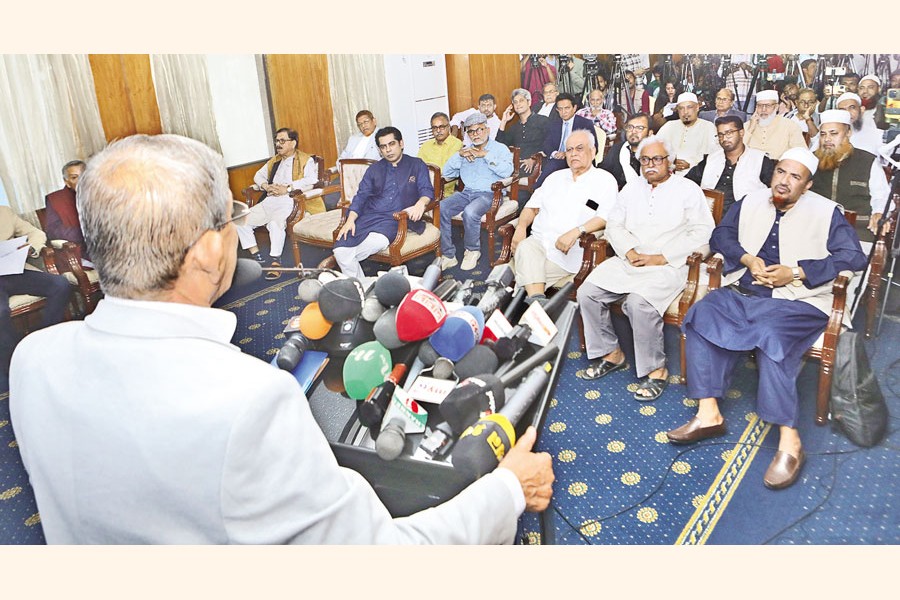
Published :
Updated :

Political leaders from across the spectrum have reached a consensus pledging their unwavering support for press freedom in Bangladesh.
They unanimously condemned recent attacks on two newspapers, emphasising that the journey of a truly democratic Bangladesh, born out of the bloody student-mass movement in 2024, could only be realised if press freedom and freedom of expression were upheld.
The politicians called for greater national unity in safeguarding these fundamental rights, also urging the mass media to act responsibly in fostering and promoting the democratic process.
The Newspaper Owners' Association of Bangladesh (NOAB) hosted the talks at a city hotel on Thursday with intent to address concerns following attacks on the two media outlets -- Prothom Alo and The Daily Star.
Expressing deep concern in his welcome address, NOAB president AK Azad described recent activities against the two national dailies as "a grave threat to press freedom".
"Every media outlet operates under its own editorial policies and perspectives. Differences of opinion are natural, and one may disagree with or even protest a newspaper's stance," he said.
However, Mr Azad emphasised that if any media outlet violated the law, appropriate legal channels should be used to address the issue.
He also appealed to the journalist community to act responsibly and uphold the highest standards of their profession.
Slamming attacks on the media, Bangladesh Nationalist Party (BNP) secretary general Mirza Fakhrul Islam Alamgir emphasised that the country's democratic movements had always aimed to establish a robust democratic system.
However, he noted with concern that certain actions at times appeared to undermine this goal by attempting to depoliticise the nation.
He urged everyone to consciously steer clear of such practices, stressing that an elected government, regardless of who won the election, was always preferable to any other form of governance.
Mr Fakhrul voiced concern over attempts to interfere with the political process, stating: "We're witnessing efforts to dictate who should hold power."
"Deciding who governs, controlling the electoral process, and manipulating democracy-this is unacceptable," he said, refraining from naming those responsible.
Bangladesh Jamaat-e-Islami assistant secretary general AHM Hamidur Rahman Azad said although his party was a victim of unethical journalism, they consistently supported press freedom, recognising it as a cornerstone of democracy.
Jatiya Nagorik Committee convener Nasiruddin Patwari condemned the attacks on press freedom while criticising the media for engaging in biased journalism driven by ideological leanings.
Bangladesh Jatiya Party chairman Andaleeve Rahman Partho said equating the ousted Awami League with the BNP in the media represented a different form of fascism.
Gono Odhikar Parishad general secretary Md Rashed Khan said this government failed to act properly with people and political parties in such a crisis time.
Gonosanghati Andolon chief coordinator Zonayed Saki said his party would be in support of free press even any of the outlets was against them.
Nagorik Oikya convener Mahmudur Rahman Manna suggested that the media give importance to even the smallest voices to foster a diverse and inclusive society.
AB Party member secretary Mojibur Rahman Monju called on all groups involved in the July-August uprising to develop a 'Charter of Uprising' to ensure that its objectives were realized.
Communist Party of Bangladesh general secretary Ruhin Hossain Prince said democracy would be vigorous through ensuring freedom of the press.
Bangladesh Khelafat Majlis leader Jalal Uddin Ahmed expressed support for press freedom while urging the media to ensure fair and unbiased coverage of their activities.
The Daily Star editor Mahfuz Anam, BSD general secretary Bazlur Rashid Feroze and Islamic Andolon leader Imtiaz Alam, among other, addressed the meeting, moderated by Bonik Barta editor Dewan Hanif Mahmud.
The Financial Express editor Shamsul Huq Zahid, New Age editor Nurul Kabir and Prothom Alo editor Matiur Rahman, among other leaders of NOAB and Editors Council, were present there.
bdsmile@gmail.com


 For all latest news, follow The Financial Express Google News channel.
For all latest news, follow The Financial Express Google News channel.